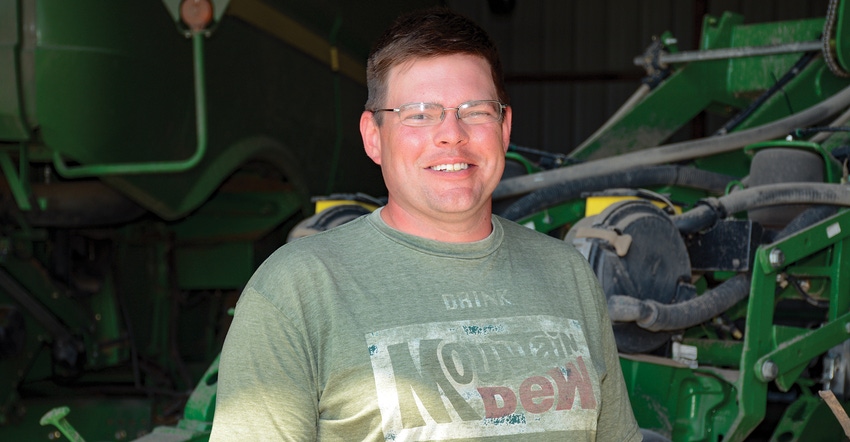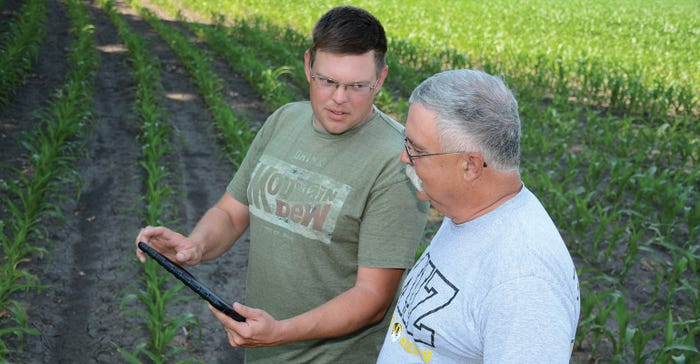
Kyle Durham grows corn and soybeans with his father, Dave, on 2,300 acres near Norborne, Mo. They have both served in leadership positions with state commodity organizations. Farm Futures caught up with Kyle to learn what keeps him up at night.
Q: What would you do if you believed tight margins for corn and soybeans would continue for the next four years?
A: As a farmer we’d have to consider other lines of income. Today it’s becoming more concentrated but more diverse, with some smaller operators coming in with direct-to-consumer food, like organic or cage-free livestock. I don’t think a guy can outright reject those ideas. He needs to see if they would fit in with his operation today.
I often thought about forming a partnership with some of these craft distilleries that are cropping up. How could you add value to your farm and their business? There’s value in that business, and there’s also value in knowing who your supplier is.
One of the challenges is rural bankers are conservative and have been trained on hard assets to protect their investments. You would have to have a track record as a good financial manager and have a business plan for any new operation, and show you understood you knew the aspects of that market. Straight farming has been good in this area. That’s probably why you don’t see much diversification.
Q: What’s your position on expansion?
A: The name of the game is scaling up; everything has gotten bigger, from equipment to acreage to risk. We try to find those places where expansion makes sense and to do it in a smart way. I’ve been farming full time since 2003, and since then, we’ve purchased 240 acres, gained another 240 in share rental ground and another 100 acres that we cash-rent. We also custom-farm a couple hundred acres.
As I look to the future, I think there are going to be opportunities to pick up acreage — whether it’s an outright purchase, some rental agreement, or maybe even some kind of hybrid, where another farmer brings in machinery or some other asset, and we can partner together to everyone’s mutual benefit.
Back when my grandfather started the farm, he was pretty progressive in growth. He could read the stitches on a fastball, so to speak. He expanded the operation, and it has followed through to Dad and myself.
Q: You’ve been farming 15 years. What would you do differently if you had the chance to go back and start over?
A: If I had known I would have come back to farm full time, I probably would have gotten an electrical engineering degree. The speed and pace of innovation in ag technology is just astounding. When our John Deere service tech comes out, the first thing he does is plug his laptop into a port on the tractor. That can be frustrating at times, especially for Dad. He grew up in an era when turning a wrench was the usual remedy to a problem, not hooking it up to your iPad.
We still try to do as much machinery maintenance as possible, but to some degree you are now forced to outsource that.

“You need to give something back along the way,” says Kyle’s father Dave (r). “If you can’t make the business you’re in better, what are you here for?”
Q: What do you think you need to work on as a manager?
A: Marketing. We started working with Cargill’s marketing services three years ago in an effort to plan more, but we still have a lot to learn on that front. That is my biggest challenge. Cargill provides some market analysis, but the discipline is the biggest part of it — to force us to set sales and pricing goals. They will call and say, “At this point we suggest having 30% of your corn bushels priced,” or provide an opinion on where the market is. I like to take in a lot of information, but whether I process it well, I don’t know. Analysis and discipline are the greatest benefits we gain from that service.
Q: What’s the biggest threat to the future of your business?
A: My dad and our full-time employee are both near the same age, and they aren’t going to want to be actively farming forever. As I look at the constant migration of folks in my community to bigger cities, you wonder where the labor force will be coming from.
There are fewer people now raised on farms, even in small rural communities. So, training is going to be a big thing — you’ll have to find somebody who wants to learn and who wants to be a partner with you of some kind. Human resource management has not been a big concern in the past, but realistically, something that will require a significant amount of time in the future.
The opinions of the author are not necessarily those of Farm Futures or Farm Progress.
About the Author(s)
You May Also Like






